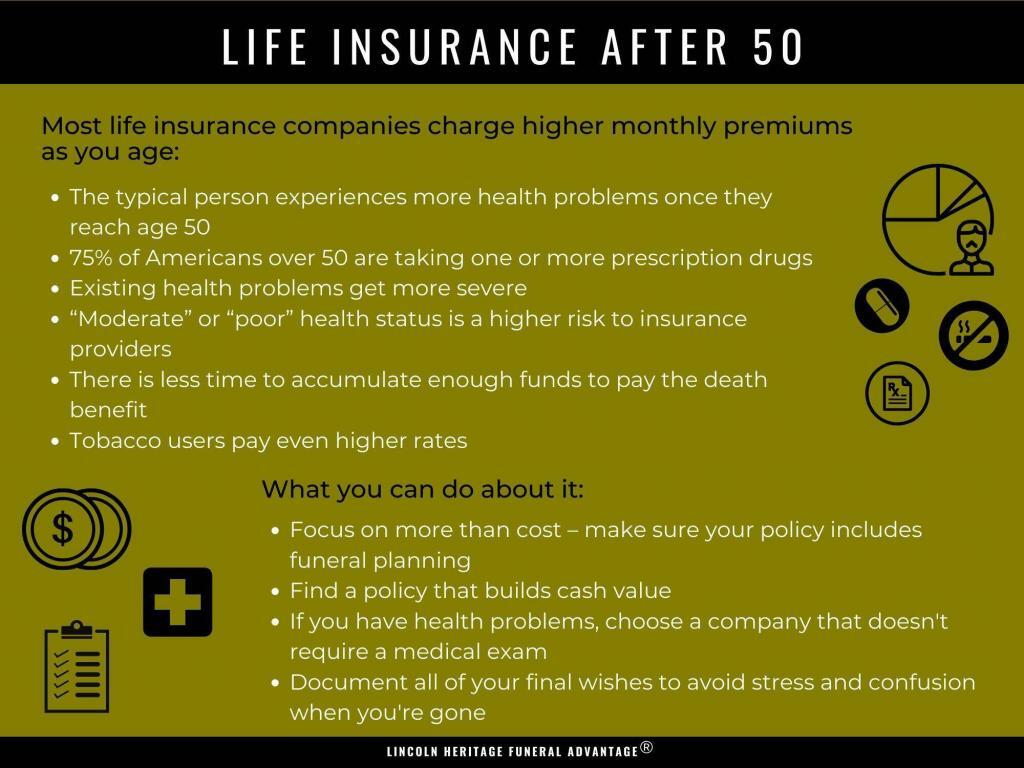Affordable Life Insurance For People Over 50

Finding affordable life insurance can be difficult, but understanding your options is the first step in finding a policy that’s right for you.
Table of Contents
Be Smart: Determine the Best Value for You
As you age, your requirements change when it comes to life insurance. Your kids have likely grown up and are living lives of their own, and they don’t depend on you to financially support them. What’s more, you may have already paid off your mortgage and other debt. That’s why so many people over 50 look at life insurance differently than they did in their 20s and 30s.
If you’re thinking about getting a life insurance policy at your age, you’ll need to think carefully about what you want from your policy. Do you want to leave a cash windfall to your loved ones, or ensure that you pay for your final expenses so they don’t have to?
Deciding what sort of policy you need, how much coverage you should have, how long you need it for, and how much you can afford will help ensure that you select the right policy for you and your family if something happens to you.
Benefits
People with new families often use life insurance to provide for them when they no longer can. They want to make sure their spouse and children can continue to live the life they’ve become accustomed to.
But once you reach 50, things change.
Even so, it still makes sense to provide for your beneficiaries in some areas. For instance, families feel an array of strong emotions dealing with the passing of a loved one, and the high costs of funerals can exasperate them. That’s why so many people who don’t feel the need to provide a large cash payout to beneficiaries do arrange for a life insurance policy to pay their funeral expenses.
And if you incurred medical bills, it’s a good idea to leave your beneficiaries enough money to pay them off. The same is true for outstanding bills like utilities, car payments, and other normal living expenses.
Financial Dependents
If others still rely on you financially, you should consider them when thinking about life insurance. For example, your spouse, children, or siblings may rely on you for financial support. When you purchase a life insurance policy, you can designate beneficiaries and ensure that they’re taken care of even after you pass.
How Much Do You Need?
Determining how much life insurance is necessary is different for everyone. For instance, if your goal in getting a policy is to ensure that your final expenses get paid, you can buy a policy with benefits as little as $10,000.
On the other hand, if you want to provide for someone financially for any significant length of time, you will need to buy a policy for much more. To determine how much, figure out how much that person needs to live and base your decision on that.
Why Life Insurance Is More Expensive Over 50

Most life insurance companies charge higher monthly premiums as you age. There are several reasons for this, but most of the reasons center around the fact that the typical person experiences more health problems once they reach 50. In fact, approximately 75 percent of Americans over the age of 50 are taking one or more prescription drugs regularly.
If you have an existing health problem, qualifying for life insurance may be challenging depending on the severity of the condition. And if you have “moderate” or “poor” health, you may be considered a higher risk to insurance providers. To offset this added risk, insurance companies charge higher premiums to ensure they have accumulated enough funds to pay the death benefit if the insured party passes away early.
Tobacco use is another common reason for higher premiums. If you’re over 50 and use or have used cigarettes or chewing tobacco, you can expect a higher insurance premium. Smokers are more likely than nonsmokers to develop heart disease, have a stroke, or develop lung cancer. Because of these added health risks, tobacco users pay higher rates.
Affordable Life Insurance: What to Look For
Your insurance needs have probably changed since you first purchased a life insurance policy. Meeting with your agent periodically to review your coverage is a good way to continue protecting what matters most.
If you’re purchasing life insurance for the first time, start by evaluating what obligations you have. Is someone financially dependent on you? Do you have outstanding debts like a mortgage or car payment?
Ask yourself, “Whom (or what) am I trying to protect with this policy?” Answering this question will help you know what to look for in your life insurance policy.
Are you trying to replace the income your family would lose if you passed away? Do you want to cover funeral costs? Pay off a mortgage? Look for a policy that can address those specific needs should you pass away.
Shopping for life insurance is a lot like shopping for a new car: The prices of several models may be relatively the same, but the specific features can vary significantly. When shopping for coverage, carefully compare the benefits offered by each insurance provider. Don’t automatically choose low-cost life insurance just because the cost is attractive. There may be a policy with features more closely aligned with your needs even though it’s more expensive.
Because premiums are higher for those 50 years old or over, finding affordable life insurance can be a challenge. Choose a policy you can reasonably pay for today, tomorrow, and the foreseeable future.
Your circumstances could change at any moment, so it’s important to choose something that won’t become a burden. Having to cancel a policy because it’s too expensive can cause you to lose the premiums you’ve already paid and can impact your ability to qualify for coverage later if your health changes.
That’s why it’s so important to make sure the coverage you select is affordable.
No Medical Exam Considerations
Some life insurance companies offer policies that don’t require applicants to undergo a medical exam. This can be important for those over 50 because this is typically the age when medical issues begin to arise.
When looking for this type of policy, look for policies that are simplified issue or offer a guaranteed approval.
When buying a simplified issue policy, you will have to answer a few medical questions on the application form, but you won’t have to take a medical exam. A good example of a simplified life insurance policy is final expense insurance.
Compare Your Options: What’s the Best and Most Affordable Life Insurance for People Over 50?
You should think about customizing your life insurance policy for your specific situation. But before you can choose a policy, you need to understand your options. You can choose from three basic life insurance policies. Let’s take a look at those now to help you determine what coverage is best for you.
Final Expense Life Insurance
Depending on your needs and age, final expense life insurance may be best for you. Maybe you don’t have children who need a large inheritance, or you can’t afford the high premiums of typical whole life insurance—but you want to take care of your final expenses instead of leaving them for your loved ones.
Commonly called “burial insurance” or “funeral insurance,” it’s a type of whole life insurance specifically designed to address any final expenses you leave behind, such as unpaid medical bills and funeral costs. Some final expense policies are considered inexpensive life insurance because coverage can often start as low as $15 a month.
Funeral expenses alone can cost up to $9,000, but having even a small final expense policy in place can help your family cover these costs.
Because the premium and coverage amounts don’t usually change for whole life policies (as long as you pay the premiums), final expense insurance is a great option if you are over 50 or if your health deteriorates. However, the longer you put off purchasing such a policy, the more expensive it will be, and the more likely your health will change. Locking in an affordable insurance rate while you’re in the best health may save you hundreds of dollars in the future.
Final expense life insurance typically offers smaller coverage amounts than other insurance policies, making them more affordable and easier to qualify for.
Because the coverage amount is lower than most other types of life insurance, some final expense policies don’t require a medical exam to qualify. Many policies can be issued based on answers to health questions on the insurance application.
Monthly Premium Rates for Men*
| $5,000 Death Benefit | ||
| Age | Determined 'In Good Health' by Insurer | No Health Questions Asked |
|---|---|---|
| 50 | $16 | $20 |
| 55 | $19 | $24 |
| 60 | $23 | $29 |
| 65 | $29 | $35 |
| 70 | $38 | $44 |
| 75 | $51 | $63 |
| 80 | $65 | $82 |
* Estimated rates do not reflect the rates of any particular life insurance company.
| $10,000 Death Benefit | ||
| Age | Determined 'In Good Health' by Insurer | No Health Questions Asked |
| 50 | $30 | $40 |
|---|---|---|
| 55 | $35 | $46 |
| 60 | $43 | $57 |
| 65 | $56 | $68 |
| 70 | $74 | $88 |
| 75 | $100 | $125 |
| 80 | $126 | $162 |
* Estimated rates do not reflect the rates of any particular life insurance company.
Monthly Premium Rates for Women*
| $5,000 Death Benefit | ||
| Age | Determined 'In Good Health' by Insurer | No Health Questions Asked |
|---|---|---|
| 50 | $14 | $15 |
| 55 | $16 | $18 |
| 60 | $18 | $24 |
| 65 | $22 | $28 |
| 70 | $28 | $35 |
| 75 | $38 | $46 |
| 80 | $48 | $64 |
* Estimated rates do not reflect the rates of any particular life insurance company.
| $10,000 Death Benefit | ||
| Age | Determined 'In Good Health' by Insurer | No Health Questions Asked |
|---|---|---|
| 50 | $25 | $28 |
| 55 | $28 | $36 |
| 60 | $33 | $45 |
| 65 | $41 | $55 |
| 70 | $53 | $69 |
| 75 | $72 | $90 |
| 80 | $93 | $126 |
* Estimated rates do not reflect the rates of any particular life insurance company.
Term Life Insurance
Term life insurance is only good for a “term.” That means you must apply for (and qualify for) a new policy every time the term expires. For example, if you purchase a ten-year term life insurance policy, once it expires, you no longer have life insurance.
The problem with this type of policy for people over 50 is twofold. It becomes more difficult to qualify for term life insurance as your health changes and every new term gets more expensive because you’re older each time you renew your term. Term premiums can vary by thousands of dollars depending on your renewal age.
Also, most term policies do not accumulate cash value.
Here are some general price guidelines for what term insurance costs.
Average Annual Term Life Insurance Rates for Men*
| Age | Policy Amount | 20-Year Term | 30-Year Term |
| 50 | $250,000 | $473 | $819 |
| $500,000 | $856 | $1,535 | |
| $1,000,000 | $1,630 | $2,927 | |
| 60 | $250,000 | $1,273 | Not available |
| $500,000 | $2,396 | Not available | |
| $1,000,000 | $4,651 | Not available |
* Estimated rates do not reflect the rates of any particular life insurance company.
Average Annual Term Life Insurance Rates for Women*
| Age | Policy Amount | 20-Year Term | 30-Year Term |
| 50 | $250,000 | $364 | $621 |
| $500,000 | $655 | $1,140 | |
| $1,000,000 | $1,174 | $2,142 | |
| 60 | $250,000 | $901 | Not available |
| $500,000 | $1,667 | Not available | |
| $1,000,000 | $3,198 | Not available |
* Estimated rates do not reflect the rates of any particular life insurance company.
Whole Life Insurance
In general, whole life insurance is usually the best life insurance for people over 50. The coverage and premium typically remain the same throughout the life of the policy as long as premiums are paid, and some plans can accumulate cash value which can be used later in life. Whole life insurance is often referred to as “permanent insurance” because you don’t have policy terms and you don’t have to re-qualify.
Here are the average rates for men and women over 50.
Average Annual Whole Life Rates for Men*
| Age | Policy Amount | Whole Life Insurance | |
| 50 | $250,000 | $5,548 | |
| $500,000 | $11,036 | ||
| $1,000,000 | $22,726 | ||
| 60 | $250,000 | $9,111 | |
| $500,000 | $18,164 | ||
| $1,000,000 | $35,807 | ||
* Estimated rates do not reflect the rates of any particular life insurance company.
Average Annual Whole Life Rates for Women*
| Age | Policy Amount | Whole Life Insurance | |
| 50 | $250,000 | $4,611 | |
| $500,000 | $9,164 | ||
| $1,000,000 | $18,021 | ||
| 60 | $250,000 | $7,530 | |
| $500,000 | $15,100 | ||
| $1,000,000 | $29,546 | ||
* Estimated rates do not reflect the rates of any particular life insurance company.
Universal Life Insurance
If you want a permanent life insurance policy like the whole life products but with a little more flexibility, a universal life insurance policy might be right for you. With this type of policy, you get all the benefits of a permanent life insurance policy but have some flexibility in how you use it.
For example, you may have the option of changing your benefits to suit your life’s circumstances. And because universal life insurance also has a cash value component, you can use it to pay your premiums if the value is enough to cover them.
Here are the average rates for universal life insurance for those over 50.
Average Annual Universal Rates for Men*
| Age | Policy Amount | Universal Life Insurance | |
| 50 | $250,000 | $4,884 | |
| $500,000 | $9,708 | ||
| $1,000,000 | $18,828 | ||
| 60 | $250,000 | $7,524 | |
| $500,000 | $14,900 | ||
| $1,000,000 | $29,856 | ||
* Estimated rates do not reflect the rates of any particular life insurance company.
Average Annual Universal Rates for Women*
| Age | Policy Amount | Universal Life Insurance | |
| 50 | $250,000 | $4,260 | |
| $500,000 | $8,460 | ||
| $1,000,000 | $16,812 | ||
| 60 | $250,000 | $6,552 | |
| $500,000 | $13,032 | ||
| $1,000,000 | $25,944 | ||
* Estimated rates do not reflect the rates of any particular life insurance company.
FAQS: Affordable Life Insurance over 50

Life insurance has a place in every financial plan. The purpose of a life insurance policy is to help protect your assets and provide for loved ones when you’re gone. It’s not uncommon for many life insurance policyholders to re-evaluate their insurance needs as they age. The reason is simple: the priorities of a 30-year-old differ significantly from those of a 40- or 50- year old.
If you’re considering buying life insurance, Here are a few more facts about life insurance for people over 50.
Do People Over 50 Need Life Insurance?
It’s a misconception to think that people over 50 don’t need life insurance. The truth is, there are plenty of reasons why fifty-year-olds—and those older—will benefit from life insurance. Here are a few things to consider:
- If there are people that depend on you financially, they may struggle to make ends meet when you’re gone. Without a life insurance plan in place, basic bills may go unpaid.
- Funeral expenses can easily exceed $9,000, but you don’t have to saddle your loved ones with that financial burden. By purchasing life insurance, your burial costs, medical expenses, and other outstanding bills can be taken care of.
- If you plan to leave your estate to your loved ones, they may have to pay estate taxes. Not everyone can afford the taxes, and some people have to sell personal items just to pay them. But if you name them as a beneficiary in your life insurance policy, they can use the cash to pay those taxes.
- If you leave a business to your beneficiaries, having a life insurance policy is one way to ensure that they will have the funds they need to carry on the business.
What Features Are Useful for People Over 50?
Different types of insurance policies include various features that are helpful to people over 50. Here is a list of some of the features you can take advantage of.
- A single premium policy, also known as a paid-up policy, enables you to pay for the life of the policy up front and never have to worry about monthly premiums as you age.
- Because your earning potential declines as you age, an accelerated feature allows you to pay more in premiums at the beginning of the policy and enjoy lower premiums once you’re retired.
- The cash value of a whole life insurance policy is yours, even if you cancel the policy. And it’s tax-deferred.
- If you need to take out a loan against your cash value, you can.
What Are Other Types of Insurance to Consider?
Whether you purchase a term or whole life insurance policy, you can find various policies that may be better suited for your circumstances. For example, here are some types of policies that are perfect for people over 50:
- Survivorship Life: This is a whole life insurance policy. When older couples have a disabled child, they often worry about what will happen when they’re gone. But you can purchase this type of insurance policy to protect your child once you are both gone. The policy doesn’t pay out until you have both passed. Buying this type of policy is less expensive than if you had to take out two policies for both of you.
- Convertible: With this type of insurance policy, you can start with a term policy, and when it expires, you can convert it into a whole life policy with no medical exam.
- Decreasing Term: If your goal is to provide for your family so they won’t have to pay off your debts, a decreasing term life insurance policy can help. The payments start lower, but the death benefit decreases over time. This is a term insurance policy, and if you pay off your debts before you pass, you can cancel the policy.
- Annual Renewable Term: If you need a term life insurance policy for a set number of years — for instance, a few years before you retire — this type of term policy will automatically renew without your having to pass underwriting medical exams. But keep in mind that, although the policy renews, your premiums will increase every year.
Next Steps
Finding affordable life insurance over 50 can be challenging – often those over 50 have different needs than younger applicants. If you’re looking for a policy that’s easy to qualify for and protects your loved ones from end-of-life expenses, you may want to consider life insurance from Lincoln Heritage Life Insurance Company®.
We’ve been protecting seniors and their families for over 50 years. Our policies are easy to qualify for, don’t require a medical exam or physical, and give your family the cash they need within 24 hours of claim approval. We can issue your coverage based on your answers to health questions on our one-page application.





